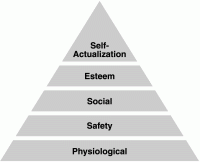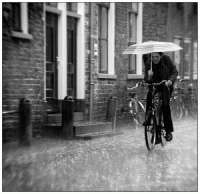It is easy to write. You simply arrange words in an acceptable form and walk away.
It is much harder to write authentically.
Before you start you have to feel yourself inside your authenticity.

"If only I could stop running I could really fly."
You must feel an undeviating connection with universal law and know that you are presenting your unique vision of truth as only you can experience it.
You must feel it pass through you, untrammeled and unquestioned.
You must allow it its own life.
And that’s hard to do when you’re running for your own.
Uncertainty impedes access to truth
My last few months have demonstrated some truths about gifted functioning and have also confirmed – for me at least – the truth of Maslow’s hierarchy of needs.
The primary truth is that gifted adults need environmental stability in order to maintain a sense of their gifted identity.
And here’s how I found out:
Last October, Susan and I moved from Tulsa, Oklahoma, to Bournemouth, UK. It was a big move.
Not only did we have to move ourselves, our belongings and our cats, we also had to sell our house, car, and loads of ‘stuff’. A coordinating nightmare.
I also had to start a new practice in a new location as soon as I arrived.
Maslow’s pyramid of . . . woe?
A major transition of this kind is a real test of persistence and resilience.

Maslow was right: upstairs is more fun.
For us, higher life issues such as meaning and spirituality went out of the window as we dropped down through the layers of Maslow’s hierarchy, finally touching bottom in the basic food and shelter section.
As the corporate bods are prone to say: “When you’re up to your neck in alligators it’s hard to remember that your original intention was to drain the swamp”.
Only now, four months and a few days after we drove out of Tulsa, do I feel I’ve reduced the alligator population sufficiently to be able to write anything more thoughtful than an angry note to the telephone company.
What has this to do with being gifted?
The gifted population doesn’t take kindly to being forced to dwell for extended periods in the hand-to-mouth domain.
Our talents and drives push us rapidly up the requirements scale with a powerful need to satisfy our lust for original thought, creative action, and the joy of connection to the universe.
This doesn’t sit well with the need to restrain one’s impatience with a slow-witted clerk at Sky HQ who’s never heard of anyone installing two separate telephones in their house before.
Or the utility company that can’t tell you whether it supplies you or not.
We lost hundreds of valuable hours in ought-to-be trivial pursuits that were made significant by the poor planning, customer contempt and systemic stupidity of the institutions we were forced to deal with.
G – r – r- r – r – r!
No identity, gifted or otherwise
While battling unseen enemies, I continued to function at a reasonably high level. I was organizing, working, planning, ‘moving in’.

"Can you see the real me?" 'Quadrophenia', The Who.
But from a gifted perspective, I felt “I” had completely disappeared.
My true self had been fragmented by a hail of logistical and administrative shrapnel.
To maintain balance, I would regularly and consciously regroup and re-centre myself.
However, I found it hard to feel a direct connection with the universe when physically tired, logistically disconnected, and under constant bombardment from the mundane world.
I was a classic case of being out of my comfort zone.
The psychological comfort zone
For the gifted, our ‘comfort zone’ begins with a simple truism: we are super sensitive.

"You might think you can see my carapace but I promise you it's really invisible."
We are as aware and as prone to injury as any sea anemone. And our awareness and vulnerability is even more psychological than physical.
So we develop a psychological protection – an invisible carapace or impermeable membrane designed to enable us to thrive even in risky psychological worlds.
This invisible covering is a structure built from rationalizations, denials, compensations and other defensive constructs.
We use these as filters to reduce the painful impact of ugly sights, hostile encounters, and our powerlessness in the face of ‘stupidity’.
Because so many of the factors we need to defend against are local and cultural in nature, much of our defense is not universally applicable. It is adapted to our current bio-psychosocial environment.
So when we move to a different environment our existing cover no longer works. We feel raw, exposed, in pain.
Until we’ve built a new one.
Constructing a new comfort zone
From the comfort zone perspective, a major move is actually a process of deconstruction, fragmentation, reconstruction.

It would have looked silly in Tulsa but it works fine over here.
It is not that “I” have changed. It’s my environment, the things that impinge on me as the simple result of being human.
These include the daily pressures and stimuli, the cultural assumptions and expectations, the impact of the weather, political attitudes, laws, the way ‘they’ dress.
And I experience each of these differences as a separate physical, emotional or intellectual jab.
As we have seen, the protective covering I created for myself – albeit unconsciously – in Tulsa doesn’t work at all over here.
Its psychological battlements, curtain walls, turrets, towers and arrow slits are the wrong height, misplaced or facing the wrong way.
(Not) Feeling the heat
Also, some of the things I had to armour myself against over there do not exist here, and vice versa.
To take a physically-related example, I worked hard to build the mental ability to tolerate the great heat of an Oklahoma summer and even to thrive in it.
For a long time I couldn’t stand it, staying resentfully inside my air-conditioned home
Then I found – or created? – an inner sense of a pioneering self who would tackle the heat head on, rowing, running and mowing the lawn to the point of heat exhaustion. My sweat was the mark of my heroism.

Modern British hero?
Perversely, here in the UK, I find no relief in the knowledge that I won’t have to go through that pain again.
Instead, I miss the sense of triumph, the small plank of victory that contributed skeletal support to my amorphous feeling of integrity and identity.
So my inner hero must put aside the Tulsa experience, tolerate a period of uncertainty, and then construct a new victory plank to contribute the same support function.
I’m not sure it’ll be climate related. Somehow, putting on a raincoat and splashing through the grey mush of a soggy English day doesn’t have quite the same heroic feel as sculling into the teeth of the wind in 40C heat.
But give me time and I will find a new structure and a new sense of the same ‘me’.
Recovery time
And maybe this is the point. There are some things that are simply time-dependent.
Physically, we know that it is the time of recovery between workouts that actually builds our muscles and improves our fitness.
I believe it’s the same psychologically.
And I believe we gifted adults are perfectly placed to make our recovery times unusually valuable, because:
- We are much more conscious of what is going on.
- We are readier to let go of things that no longer work.
- We have a zest for life that promotes creative solutions.
- We can’t tolerate being locked in air-conditioned rooms for long!
Trust the change

Trust the process and your life will become a merry dance.
Not all moves are geographical.
We ‘move’ jobs, partners, belief systems, activities.
We experience ‘moves’ as others come and go, laws change, economies stutter.
But I suspect that all moves follow a similar deconstruction, fragmentation, reconstruction process.
And if you trust your giftedness by allowing your ‘moves’ to happen in a conscious but non-interventionist way, they will serve you well.
And the swamp will be drained.
And I’ll return to blogging again.
Ciao!
Your words are spot on! Change is a huge challenge for gifted children and adults. You capture on many leaves what I have experienced and my clients struggle with daily. I hope you do not mind if I pass this on to others?
Thanks,
Kathleen
Welcome back online.
C– with totally different specifics than a half-way-round-the-world move, the past year and a half or so have certainly given me the kind of experiences that I can relate to the deconstruction, fragments, reconstruction ‘steps’ you describe. I have not experienced them as linearly ordered steps. As I’m pretty sure you have experienced, it’s been more like alternately giant-gaping/little-baby steps up and down and back and forth, and mostly the work of the heart/mind/soul rather than the more well-equipped feet. This posting give me a new and helpful perspective with which to view the past year; that I have been turning my old “towers and turrets” in an effort to remain protected, and the busy-ness of that kept me distracted enough, that only now am I — as the sensitive being you describe — allowing myself to feel all the losses. I’m glad that you are feeling more authentically ‘in’ yourself, and writing again. I love our conversations, but I really enjoy getting to experience you in writing; the time to absorb, reflect and — while I certainly have made this posting about me (laughter!!) to think about YOU for a bit. Big hug, ph
Christopher:
Great post! I think you make some excellent and insightful points about adaptation, and how much more intense it can be for us gifted individuals to adjust sometimes, particularly when we’re forced to deal with basic life necessities instead of ideas.
As an example, I worked the graveyard shift in a bakery for a time, and I was so phenomenally busy from the moment I arrived to the time that I left, that I actually felt the lack of time to think. I craved it like a fish craving water–a live or die kind of dynamic.
That was, of course, an extreme example. But I also find that even making the adjustment to a new office environment, or group of coworkers, to be far more traumatic for me than it is for most people. And one of the reasons for this is my obsessive tendency to want to understand everything–that if someone looks at me funny, or if a meeting doesn’t feel quite right, or if the priorities of the organization seem a bit misplaced to me, I’ll endlessly analyze these anomalies, in an effort to make my peace with them. And I don’t often succeed.
I read something very interesting the other day in Kyra Mesich’s book The Sensitive Person’s Survival Guide to the effect that especially sensitive (aka, empathic) people, because they sense and perceive so much more than others, often fall prey to emotional contagions that most others wouldn’t notice. I quote:
“When I worked as a psychologist, I saw numerous people with symptoms like mine. Unrelenting depression or anxiety haunted them their entire lives. These patients never were entirely helped by psychotherapy or medication. Now I realized that it was likely they were empathic too.”
What I get from this is that people who are sensitive can’t help but feel more generalized pain, and experience more difficulty adjusting to new situations than those individuals whose carapaces are far less permeable.
Perhaps as you say, if we trust our giftedness to guide us, we can find better ways to push through and accommodate these life changes. I’d like to think so, at least.
Thanks S. It’s good to be back.
Thanks Phyllis. I suspect your new towers and turrets are destined to defend without inhibiting your actions. There’s nothing worse than being parked in Disney World for life. Hugs to you, too. c
glad you are back. wonderful post.
Thank you Valerie, for your greeting and your kind words.
Christopher – Wow! Thank you for such an insightful view of how moves and changes impact our sense of self. It validated my own recent struggles, and offered some explanation for the bumps and bruises that result from having our familiar defenses removed. Great post and welcome back.
LH
When I need to adapt to a new situation, I feel like Bruce Lee, poised and ready at all times for an attack that could come from anywhere. That’s my default setting, anyway, so it’s nice that it comes in handy once in a while. In the last decade I’ve had to deal with a lot of change, to the point where I’ve adopted a permanent state of suspension and “wait and see.” This is a welcome rest from my usual permeable soul and all the pain and fear attached to that. I’ve got my own tiger to ride. Compassion isn’t erased, but it isn’t as loud, either. I suspect a time will come when all the stuff I set aside will call for my attention.
I’m impressed by your ability to make such a huge change. I’m not sure I’d be up to it–I’d surely suffer. I hope you are finding your treasures there, and lots of good work and play.
I love the idea of your riding a tiger looking like Bruce Lee, Donna. That’s about as martially artistic as life gets. As for play, waddya think I am? Healthy? Balanced? Blessed with a sense of humor? Git back ‘n’ pick more cotton, that’s what I always say. ;o)
Thank you Linda, it’s a great pleasure to hear from you. May your bumps and bruises quickly resolve themselves into powerful guides toward ever more joy.
Long time skulker, first time reader. Love this blog, keep up the good work. I’m only now coming to terms with my “weirdness” as a grown adult, and it’s great to see someone who thinks on the same wavelengths I do, and it’s interesting seeing a manifestation of these intuitive mechanisms that operate almost blindly in me. Being able to view them helps conceptualize it as a tool, so to speak, and I’m interested to see it see how it can be applied like a tool to see if it’ll make my world run a little more smoothly.
For most of my life my mechanisms for adaptation were to consider the way I thought and felt about the world an anomaly, and to then sinch off those aspects of myself that I didn’t see in other people or the world around me, because for some reason I thought I was somehow wrong and that it would help me get along (did it help? Short answer: Nope!) That, and the absolute pain of thinking everybody saw all the variables of human emotional conduct, that small actions and words and events could have lasting impact on other human beings many steps down the road, and assuming that people act knowingly with that in mind… it felt like an indictment of my soul. I just didn’t realize people had no clue about what I was even seeing.
Now I just realize people see the world differently. My most important adaptation was understanding that people have different perceptions of the world, and each individual lives in his own universe of his perceptions since our brain is an organ, and so view the world mentally much like how their eyes would view the world visually, as in, limited by the physical nature and structure of that organ (of course that’s incredibly simplistic way to put it, there’s way more going on to that, and a lot I don’t understand, but bear with me) and that they act and think accordingly within their own worlds … when many people share similar perceptions, it’s a connection of all their worlds into a larger world (I suppose it’d be called mainstream culture). It’s like being able to speak the same language and having the same customs, they’re just ingrained physically.
Having a world that’s far off from that, cultures don’t connect and it creates communications and understanding barriers so to speak (for example, you’re an American and you’re thrown into the middle of an African tribe… assumptions, understandings, all that good stuff, are completely off, and so without work, the natural course is misunderstanding and incompatability on both sides). What’s helped me most is understanding, first, that we all share humanity together and life in this incredibly small, finite existence, and second, that since we have different individual “mind cultures” so to speak, not to take everything so close to heart and soul when incompatability arises (but it’s really hard to do sometimes!)
Anyway, sorry for the little missive, I’m just not used to talking about these things and enjoy the opportunity. Ehhh, great blog!
Matt
Christopher: Thank you so much for sharing this experience.
It is key how we protect ourselves from our sensitivities, intensity and vast input.
I grew up as a military dependent – changing environments every 18 months on average. I developed a membrane that allowed swift interactions, establishing connections quickly – even significantly personal and yet superficial. That served me well to establish myself in a new community and not look back or hold onto the prior connections. However, as I have chosen to stay in one place for my children (even thought wonder lust continues to rage within) my venue of survival does not serve as well now.
Being caring & compassionate I connect with others. However out of protection there is still a detachment and separation. You add in the different responses of others to connections between “gifted” and “normal” and there is a another membrane of protection that is usually much stronger and less permeable (a definite response to pain and rejection).
The love of adventure and experiencing new things is another counterpoint. Plus the journey of Intense Identification and Expression of me as gifted.
Thanks again for sharing this and other parts of your journey. Edith
Again, a little late to the post, but I’ve only just discovered your blog. Great articles, reflect a lot of what has gone on in my life, and what seems is destined to continue well into old age (only 30, so there’s time). I spent almost 8 years in the military, due to the belief that life was pointless so I might as well put mine to good use if I’m just going to lose it one day, and ended up almost losing my identity instead. I’m out now, have been for a couple of years, and am rediscovering what it means to be me – still misunderstood, and definitely under-achieving, however at least now I’m able to change on my terms.
It’s amazing how much effort is put into just being quiet and fitting in, in order to get work done with a minimum of fuss. The goal now is to be able to express myself in a way that others can understand, and not unintentionally create a greater feeling of isolation.
Keep up the blog, it’s great!
What an amazing post!!!
I have to thank you because you help me to answer some questions…
I’m french and 3 years 1/2 ago I came to Australia for 1 year… I’m still here! I’ve lost my comfort zone and I’m battling in my reconstruction process. Especially since my partner (who is gifted as well) decide to broke up. I’ve got no family here, no friends, 3 different jobs but no real one (with good money I mean), not a lot of money and a 18 months old daughter (gifted I guess!) full time. And I’m in a country that is not mine with a different language… Everyday is a challenge!!
Thanks for your help!!
Thanks for the great article.
I would venture taking a look at a few other aspects of ‘giftedness’- the sensitivity/empathy can take a walk into what is deemed ‘paranormal’. I believe many of us have our antennae at a higher frequency than the average person. I struggled all my life with acute discomfort with incoming sensory experience. In addition to the physical/nervous system overload, I ‘know’ things about to happen; ‘know’ information about people. It is overwhelming at times. Seeing auras around people, hearing talk from other dimensions- frankly, I’m only now, at 56, figuring it out. I keep away from people more, finding solace in my own space. Most people in my town don’t know anything about this, so I’m glad to both write of it here, and know that the site is ‘closed!’ I’ve been invited to join a Mensa group, but fear I would be watching a ‘ego contest.’ What I have done, tho, is use the intuitive ability in business; I have innovations patented, and am interested in helping young people begin entrepreneurial endeavors with the income. Ok, must away to make dinner. Thanks!